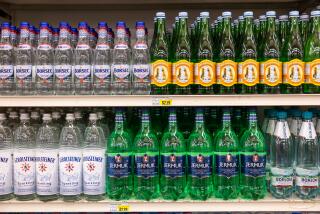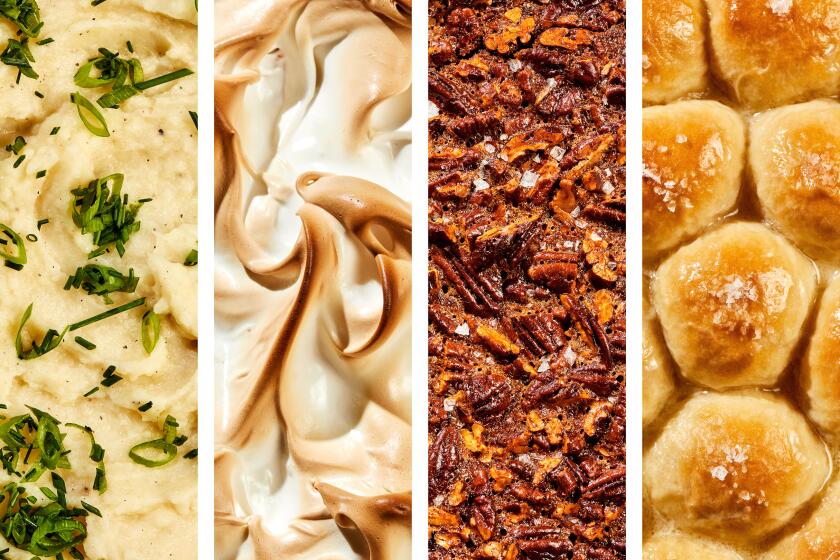Makers of Box Wine Dilute Product and Spike Profit
The makers of cheap wines sold in cardboard boxes have discovered a clever way to boost profits and make their product even more appealing to novice wine drinkers: Just add water.
A loophole in the federal government’s wine standards has allowed makers of boxed wines to water the stuff down while still using classy varietal names such as Merlot and Cabernet Sauvignon on the labels. The tactic has made this stagnant segment of the business, which accounts for about 7% of all wine sales, attractive again. However, the strategy is drawing fire from California wine grape growers and premium wine makers who say the labels mislead consumers and create unfair competition for the rest of the industry, which must adhere to strict federal standards.
Pressure from these groups, along with evidence that consumers are indeed misled by the labels, has prompted the Bureau of Alcohol, Tobacco and Firearms to review the labeling standards for much of the $200-million-a-year boxed-wine category, a process that could take a year. Art Libertucci, assistant director of the alcohol and tobacco division of the ATF, said the agency will also consider forcing certain brands to change their labels.
However, Canandaigua Brands, which each year churns out 30 million cases of boxed wine under the Almaden name, says it isn’t giving up the category without a legal fight. The new formulas have not only been more popular with consumers, they can be less expensive to produce, say executives from Canandaigua and E&J; Gallo.
“A government agency can’t change their mind after companies have already made a large investment in developing these products. That would be incredibly unfair, if not illegal,” said Robert Sands, Canandaigua executive vice president.
To most consumers, the labels on these so-called formula wines are virtually indistinguishable from those on traditional table wines, using descriptions such as “Chardonnay with natural flavors.” However, a large portion of the content of popular brands such as Almaden, Peter Vella, Carlo Rossi and Franzia can include water, sugar, fruit juice or a distilled grape alcohol in addition to actual wine. Virtually all of these formula wines are sold in boxes; at least one, Carlo Rossi is sold in a jug.
Most consumers don’t know they’re drinking something other than varietal wine, at least according to a survey commissioned by the ATF a year ago.
“Our survey told us most consumers weren’t making a distinction,” Libertucci says. “We decided to see if we couldn’t establish a special set of rules for these products so customers won’t be confused.”
Under the ATF’s rules for traditional table wine, 75% of the product’s volume must come from grapes of one variety. Under the specialty wine or “other than standard” category, which includes boxed wines, there is no minimum amount of wine they must contain.
In order for the varietal name to be on the package, three-quarters of whatever amount of wine is in the product must contain grapes of one variety. So even if the beverage contains only 10% wine, as long as 75% of that is Chardonnay, the label can say “Chardonnay.”
Calling this labeling loophole a threat to California’s wine-making reputation, the Wine Institute and the California Assn. of Winegrape Growers have asked the ATF to remove the varietal designation from these products.
“They are wearing a varietal [designation] that they didn’t have to earn,” says Karen Ross, CAWG president.
Although sweet wine-based beverages such as wine coolers have been around for decades, only in the last two years have wine makers tried to sell such products under varietal labels.
Sands, of Canandaigua Brands, says his company changed the formula for Almaden in 1997 to give consumers more of what they wanted--a sweeter, milder-tasting wine. Other large companies, including Gallo, followed suit. Since its reformulation, Sands says, Almaden’s sales have increased in the “double digits.”
However, consumers were left in the dark, competitors say. Under ATF regulations, the makers of these wines aren’t required to disclose their ingredients or how much wine they contain on the label.
Although some claim these beverages will taint the state’s wine-making reputation, others say the true impact will be felt by grape growers in the San Joaquin Valley, who supply much of the grapes for the less-expensive boxed wines.
With boxed wines using less and less real wine, demand for wine grapes has fallen. Diminishing demand, coupled with a substantial amount of new planting, has pushed prices down more than 50% this year, said Barry Bedwell, president of Allied Grape Growers, a 550-member cooperative.
“You cannot compete against the price of water,” Bedwell said.
More to Read
Eat your way across L.A.
Get our weekly Tasting Notes newsletter for reviews, news and more.
You may occasionally receive promotional content from the Los Angeles Times.










